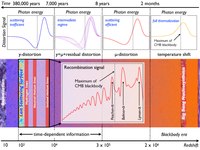
Photo from wikipedia
This study is an attempt to determine by Hot Distortion Test (HDT) the impact of physical methods of hardening inorganic binders in the moulding sands on phenomena caused by influence… Click to show full abstract
This study is an attempt to determine by Hot Distortion Test (HDT) the impact of physical methods of hardening inorganic binders in the moulding sands on phenomena caused by influence of thermal energy from heating elements with a temperature of 900°C +/10°C. Medium silica sand-based moulding mixtures were densified and then hardened using two physical methods: microwave heating at a frequency of 2.45 GHz or classical drying at a temperature of 110C. Sodium silicate bonded sand (SSBS) with five unmodified kinds of hydrated sodium silicates subjected to two different types of hardening method were assessed in terms of their behaviour in high temperature. Thermal behaviour by means of deformation measurement was carried out with a modified Hot Distortion Test (mHDT). Due to this advanced, but unstable by appropriate standards Hot Distortion Test gives an opportunity to measure thermoplastic deformations (L) in moulding sands in many aspects, such as time of annealing. Research carried out in this way exposed differences between inorganic binders with molar module ranging from 3.4 to 2.0. It was established that deformations under the influence of high temperature last the longest in SSBS containing binders with molar module ranging from 3.4 to 2.9. Similarly, for these types of moulding sands the method of hardening the binder is found to be essential for increasing/decreasing the rate of thermoplastic deformations during the annealing of samples. The samples of SSBS made with binders with molar module from 2.5 to 2.0 are found to be excessively susceptible to thermoplastic deformation as a result of heating them in high environmental temperature presence.
Journal Title: Archives of Foundry Engineering
Year Published: 2023
Link to full text (if available)
Share on Social Media: Sign Up to like & get
recommendations!